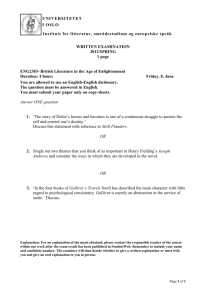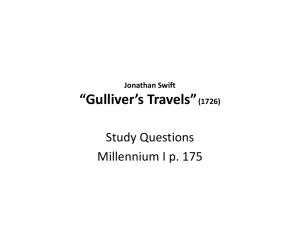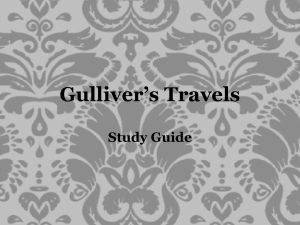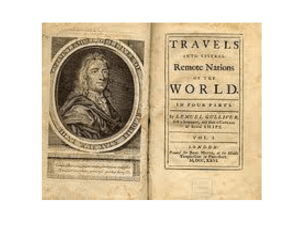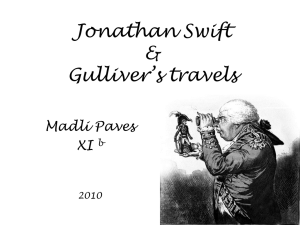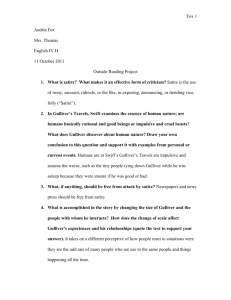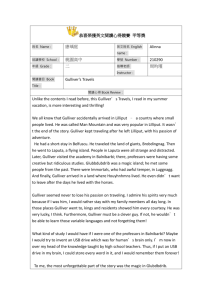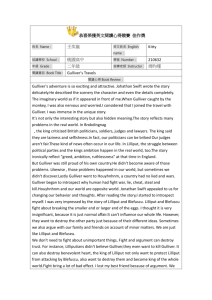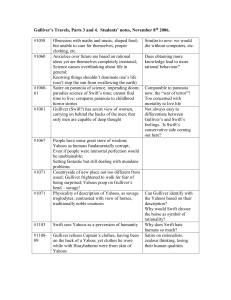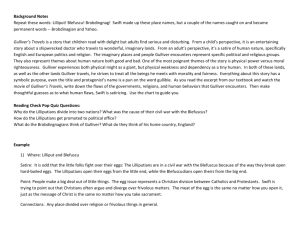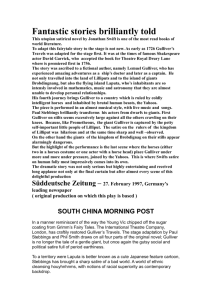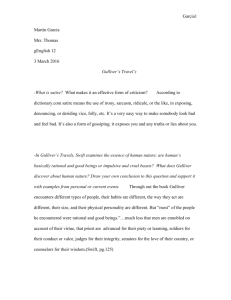Gulliver's Travels: Lilliput - Questions & Answers
advertisement
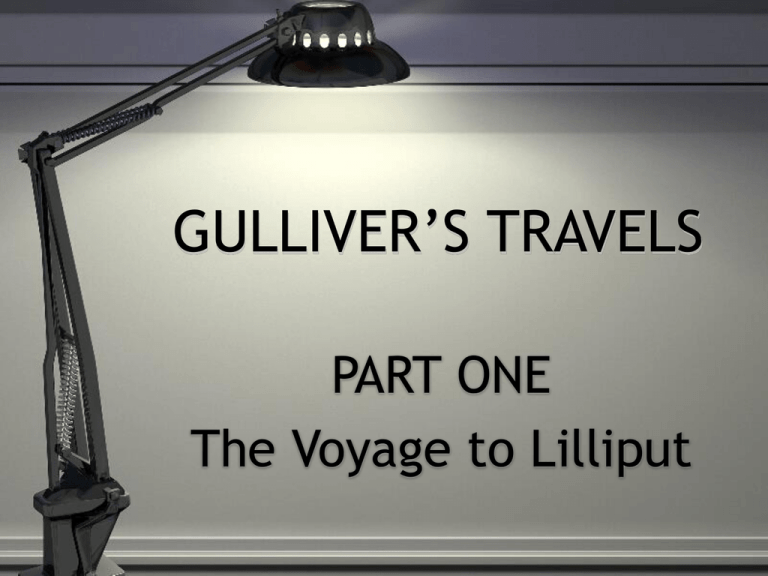
GULLIVER’S TRAVELS PART ONE The Voyage to Lilliput QUESTION #1 What do you think is Gulliver's probable frame of mind in the opening passage? ANSWER • • • • Confusion Surprise Fear Curiosity QUESTION #2 What does the Lilliputian language add to the narrator’s report? (hint: ‘Modest Proposal’ statistics) ANSWER • Authenticity • Humor • A parody of Language • ENGLISH IN THIS CASE QUESTION #3 In the comparison of random arrows to bombs (p489), how does this passage hold significance in this story? ANSWER • Makes light of the wars in Europe • Compares bombs to arrows that feel like tiny pinpricks • Draws parallel between make-believe society and his own • Indicates an amusing story with serious undertones QUESTION #4 (End of 489) What details lead Gulliver to his conclusion of whom the ‘principle person’ is? ANSWER • • • • • Speaks from a stage Gives a long speech Lilliputians respond to his directions Taller than his attendants One attendant carries his train QUESTION #5 (490) Define ORATOR: How does a person act ‘every part of an orator’? ANSWER • Person who speaks in public • Broad gestures • Loud voice • Announcing tone QUESTION #6 Do you find Gulliver’s ability to communicate through sign language and gestures very convincing? Why/ Why not? ANSWER • Communicating HUNGER-• Convincing because Gulliver receives what he needs • SHARED GESTURES- “more” • throwing an object down • If not convincing-- swearing sincerity QUESTION #7 By the end of p491, what is Gulliver’s internal conflict? ANSWER • Possibly mixed emotions of: • ANGER- imagines throwing them • FEAR • RESPECT of LAWS of HOSPITALITY • Self-Preservation vs. Trust and Gratitude QUESTION #8 What humorous details enliven the description of the Lilliputians(top 492) ? What effect has humor played to enrich the descriptions of the relationship being established between Gulliver and the Lilliputians? ANSWERS • Dancing on Gulliver’s hand • Playing ‘Hide and Seek’ in his hair • Playing children’s games • Shows Gulliver as PLAYFUL, not a dangerous giant; TRUST built between them through the trivial activities. QUESTION #9 Define SATIRE: What might Swift be satirizing in the ‘ropedancing’ ritual? (hint: Politics) ANSWERS • Work where RIDICULE is stressing the WORST parts of a serious subject. • • • • Courtly Behavior English Court Irrelevance of test to position Ridiculousness of office politics and favoritism QUESTION #10 (bottom of 2nd column. p492) What seems to be Swift’s satirical point in describing the ‘diversion’ with the red, blue and green threads? ANSWER • Seems to be poking fun at the courtiers ‘agility’ in sidestepping responsibility. QUESTION #11 How does Swift diminish the philosophical division between the two factions in England? (493) ANSWERS • Parody of the two (2) factions: • Uses two nearly identical but nonsensical names (Tramecksan / Slamecksan) • Indicates that their violent differences are based on something as insignificant as the height of the heels of shoes. QUESTION #12 (middle 2nd column, 493) Why does the ‘heir’ walk with a hobble? ANSWER • LITERALLY- he is wearing shoes of two different heights • FIGURATIVELY- he cannot make up his mind, so he is ‘hobbled’ by his indecision QUESTION #13 (2/3 down 2nd Col., 493) Why does Swift satirize the lines beginning with: “For as to what we have heard you affirm…” and ending with , “…or one of the stars.” ANSWER • NARROWMINDEDNESS • When events or people do not fit into preconceived notions of the way the world works QUESTION #14 Is there humor in the description of the eggbreaking conflict? ANSWER • Yes • Funny to get upset over the way an egg is broken • NO- ????? (like, I don’t get it…) QUESTION #15 How is Gulliver’s decision, made at the end of this voyage, satirical? ANSWER • Although he first stated that he WOULDN”T INTERFERE Gulliver quickly rationalizes to do the EXPEDIENT thing-- FIGHT FOR LILLIPUT Tories and Whigs • Represented by the two parties in this story: Tory • A person who opposed the breach with Britain during the Revolutionary War (1775-83) • Conservative Party • Opposed Whig attempts to excluse the future James II from succession to the throne. Whig • Organizer of “Glorious Revolution” • Non-Catholics
